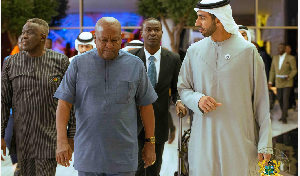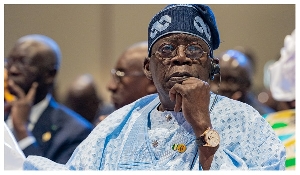By Cletus D Kuunifaa
That no one is a repository of knowledge will guide us in this write-up. Concepts are dynamic and demand our interpretation of them to suit our discussions. The fact that a word like “Cyber” gains notoriety and enjoys explosive use with the rise of the internet in the early 1990s should not surprise us. As a prefix, we have cybertalk, cyberart, cyberspace, cybernetics, cyber semiotics, cyberfashion and the list continues. When used within a context determines its meaning. So, we have people talking about cyber bullying, cyber crime, cyber terrorism and cyber Monday etc.
At this point, we want to reference a featured article of Saturday, 18 May 2013, by one Professor Lungu that purports to rubbish President Mahama’s use of the two worded concept “silent corruption”. The President expressed that African leaders should help deal with the menace of “silent corruption” on the continent, saying it is the type of graft that does not necessarily involve any direct acceptance of bribes. He then said “silent corruption” manifests in the poor execution of public-sector projects with inadequate inputs, and the supply of substandard goods - especially drugs and equipment - to public-sector organizations.
What is wrong with this interpretation that the President gives to “silent corruption”, should I ask Professor Lungu? No one needs a lecture on neither Semantics nor Sociolinguistics, to understand what President Mahama tried to impute here. In fact, it is no secret that corruption is reckoned to be the major cause of Africa’s under-development, depriving the continent’s people of adequate public services even as the wealthy few live in comfort. Former Secretary General, Kofi Annan pointed out that corruption accounts for loss of several billion dollars annually from shady transactions and deals that leave government officials clandestine winners and the public the worse for them. If corruption does not constitute a major obstacle and or alarming news for us to worry about, what else does?
Lauretta Vivian Lamptey of the Commission on Human Rights and Administrative Justice (CHRAJ) in Ghana in a well received presentation on ‘Corruption and human rights: ‘Silent Corruption’’, sought to show that not all corruption is as visible as we might believe. She postulated that some of the corruption is ‘silent’ and went on to elaborate by illustration. For the purpose of clarity, here are Laurreta’s illustrations as captured from the website of the Human Rights Commission (HRC) which recently hosted an international workshop on human rights and corruption which brought together participants from several African countries.
Lauretta said: Take the scenario where a medical doctor is supposed to be at the hospital working and attending to patients but is instead at his private surgery or elsewhere, where he does ‘on call’ duties for extra money. A patient in urgent need of attention arrives at the hospital but for lack of the kind of expertise this doctor can provide, dies because the doctor is absent or arrives late having taken an extra hour or so to finish off wherever (s) he was. Two problems are at play. The doctor is neglecting his/her duties, for which (s) he will nevertheless be paid, in preference to making an extra coin elsewhere. This, according to Lamptey, is a very common and serious form of corruption. It is ‘silent’ in the sense that it is not readily noticeable and many people may not recognize it as a form of corruption, yet when viewed against the major definitions of corruption, it does qualify as corruption. (http://www.hrc.org.zm/news/corruption_and_human_rights%3A_%91silent_100060.php).
The President used a similar interpretation or analogy, if you will, be that as it may, to put to context the concept of silent corruption. Yet, for Professor Lungu, President Mahama's concept of "silent corruption" is as strange as it is misguided. The renowned professor then articulated that in the first place, "silent corruption" is exclusively an electronic data concept. It refers to electronic data lost as a result of errors by machines...." and referenced himself as if the two worded concept is/was his invention and appropriation. Professor Lungu then opined that the concept has absolutely nothing to do with the "menace of 'silent corruption' in the public sector" in Ghana…Really? The guy seems confused here because he is alluding to a concept used in electronic data, while the President is using same as a common sense concept to show how corruption can be invisible. President did not use the concept from the view point of electronic data, but rather from as a concept that directly relates to corruption which is unseen and must be tackled.
Wikipedia, a less authoritative site, refers to data corruption as errors in computer data that occur during writing, reading, storage, transmission, or processing, which introduce unintended changes to the original data. Computer storage and transmission systems use a number of measures to provide data integrity, or lack of errors (http://en.wikipedia.org/wiki/Data_corruption). From this, logically, data corruption will ultimately result in data loss. There are two types of data loss according to the Wikipedia site: 1) Undetected- also known as "silent corruption" and 2) Detected- these errors are most often caused by disk drive problems.
In light of these explanations, President Mahama as an author himself, cognizant of the application of these concepts, versatile in the use of these nuances, would have used the concept, from my interpretation, to raise awareness to deal with the menace of silent corruption. Silent corruption exists and that should not be gainsaid. Much as “silent corruption” is synonymous with electronic data should nevertheless preclude the use of it in different disciplines, too. Fact is, disciplines have become interdisciplinary and transdisciplinary and so do concepts kriss-cross and overlap. When that happens, concepts would be used differently to connote different meanings and demand different interpretations to suit the scope of disciplines.
Should experts in the field of Knowledge Management, appropriate the terms/concepts - knowledge audit, communities of practice, lessons learnt, taxonomy knowing well that these concepts are subject to different interpretations and applications by various disciplines? This is where I find nothing critical in thought in furtherance of any “critical thinking” series as Professor Lungu wants us to believe. What is critical thinking about a concept that is common knowledge and lends itself to subjectivity? What is critical thinking about a definition of silent corruption sought from a Wikipedia? I do think the renowned professor rather jumped too early, hands and legs in air, to smack down the President. I am done and no thanks!
Cletus D. Kuunifaa, Long Island University, LIU Post, New York. Can be contacted at dipnibe@yahoo.com or Follow him on twitter @ckuunifaa
Previous articles:
Lessons to learn from Bill Gates’ Visit to Ghana
Great Advocacy Work from Ambassador Ken Kanda and Team at the UN
Of Former President’s Son to President?
Ghana Elections 2012: Defeat versus Victory
A Test of Our Democracy: How Far Ghana can?
Opinions of Monday, 20 May 2013
Columnist: Kuunifaa, Cletus D














